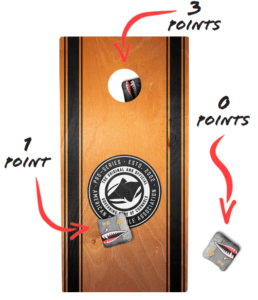Cornhole Game Rules

Before we get into the Cornhole game rules, lets talk about where it came from! The history of the game is mostly unknown, though stories abound. One story claims that the game was first played during the 14th century in Germany, and rediscovered in Ohio within the last century. Many American scholars confirm that a game of very similar nature was played amongst Native Americans in Midwest America, who filled pigs’ bladders with dried beans and competitively tossed them for entertainment, notably, the Blackhawk tribe in Illinois. Debate about whether the game was actually created in the Kentucky farmland is ongoing. It is commonly believed that the origin of the name “corn hole” came from the bags being filled with corn.

DIMENSIONS
A cornhole court shall be a level rectangular area 8-10 feet wide and a minimum of 40-45 feet long. The court should consist of two cornhole boards, designated pitcher’s boxes, and foul lines.
PITCHER’S BOX
The pitcher’s box is the rectangle 4 feet by 3 feet at each end of the court, parallel with, and on both sides of the boards. Each player must remain in the pitcher’s box while pitching a cornhole bag.
FOUL LINES
There are two sets of foul lines: (1) open adult-play and (2) junior-play (12 and under). The open adult-play foul lines shall be defined as an imaginary line 27 feet between the front of each board. The junior-play foul lines shall be defined as an imaginary line 12-15 feet between the front of each board. With regard to sets that meet ACA specifications, the foul line will be parallel to the front of the board.
See video below: Cornhole rules, tips & more
SINGLES OR DOUBLES PLAY
Every match is broken down into innings of play. During an inning of play, each player must pitch all four of his/her bags. An inning is never completed until all players pitch all four of his/her bags.
Singles Play – Player A competes against Player B
- Both players stay in their designated lane for the whole game.
- Players start the game at the headboard and will alternate pitching bags until each player has pitched all four of his/her bags.
- Players then walk to the end of their lane to the other court, take score, and resume pitching back to the other board.
- The top of an inning is completed when the first player pitches all four bags; the bottom of the inning is completed when the remaining player pitches all four bags.
Doubles Play – Team A competes against Team B; each team is comprised of two people.
- Each team will stay in their designated lane for the whole game.
- Players at the headboard will alternate pitching bags until each player has pitched all four of his/her bags.
- Players at the footboard will take score and resume pitching back to the other board.
- The top of an inning is completed when both players pitching from the headboard pitch all four bags; the bottom of the inning is completed when the remaining players pitching from the footboard pitch all four bags
VALUE OF THE BAG
The approved method of scoring for the sport of cornhole is “cancellation” scoring. In cancellation scoring, the points of one player cancel out the points of their opponent. Using this method, only one player/team can score in each inning.
Bag In-The-Count (Woody) : Any bag which comes to rest anywhere on top of the board. Each is worth one (1) point.
Bag In-The-Hole (Cornhole) : Any bag which is thrown through the hole or knocked through the hole by another bag. Each is worth three (3) points.
Foul Bags – Refers to any bag that has not been determined as Bag In-The-Count or Bag In-The Hole or was designated a foul bag as the result of rules violation.

PITCHING ROTATION DURING THE GAME
The player or team who scored in the preceding inning has honor pitching first in the next inning. If neither player or team scores, the player or team who pitched first in the preceding frame shall retain first pitch in the next frame.
POSITION OF PLAYERS DURING PITCHING
- The pitcher must be within the pitcher’s box or behind the foul line at the time of release.
- A player must pitch all four bags from their designated pitcher’s box.
- Players must pitch the bag with an under-hand release.
FOUL BAGS
- The following are rule violations that must be spotted and called by a player or assigned judge. The penalty is to declare the bag a foul bag, which requires the bags to be removed from the court prior to resuming play.
A foul bag is defined as:
(a) Any bag pitched when the player has (1) made contact with or crossed over the foul line, or (2) started or stepped completely outside the pitcher’s box before the bag is released
(b) Any bag not delivered within the 20-second time limit
(c) A bag pitched from a different pitcher’s box than the first bag
(d) Any bag that contacted the court or the ground before coming to rest on the board
(e) Any bag that struck a previously defined object such as a tree limb, wire, indoor court ceiling, etc.
(f) Any bag on the board that is also touching the ground
(g) Any bag removed from the board before scoring has been agreed upon for that bag
(i).The offending team (who touches the bags) forfeits all remaining bags and tallies the score of just the bags thrown before the foul was reported
(ii).The non-offending team tallies twelve (12) points as if they had thrown four Bag In-The-Holes (Cornholes) during the inning
- A bag that leaves a player’s hand once the final forward swing of the delivery process has started shall count as a pitched bag.
- A bag that is accidentally dropped by a player before the final forward swing has started shall not be considered foul and may be picked up and pitched.
- A bag hanging off the edge of the board has value unless it is touching the ground.
Protests – If a player desires to make a protest, the protest shall be made to the judge or official at the time the problem occurs. The judge shall make the final ruling on all protests.
TRADITIONAL 21:
The game shall be played to the predetermined number of twenty-one points. The first player/team to reach (or exceed) that amount at the conclusion of an inning is the winner.
HOUSE RULES:
Non Cancellation
This game mode is played like normal EXCEPT scoring doesn’t cancel, instead every point is counted. The pros of this style moves the game along quicker. These games can be played with the first team to 21 wins or 21 exact.
**For more house rules visit playcornhole.org/pages/rules**
The following is a list of terms commonly used in cornhole:
Ace or cow pie:
A bag lands on the board, which is worth one point.
Back door:
A cornhole that goes over the top of a blocker and into the hole.
Backstop:
A bag that lands past the cornhole but remains on the board creating a backboard for a slider to knock into without going off the board.
Blocker:
An ace that lands in front of the hole, essentially blocking the hole from sliders.
Cornfusion:
When players or teams cannot agree on the scoring of a given inning.
Cornhole or Drāno:
A bag falls in the hole, which is worth three points. The alternative name is a reference to a trademark, that of a sink clog clearing product.
Dirty bag:
A bag that is on the ground or is hanging off the board touching the ground.
Dirty roll up:
A point scored when the bag hits the ground before landing on the board.
Gusher or Jumanji or double deuce or Catorce Four Bagger or Four Pack:
Four cornholes by a single player in a single round.
Hammer:
The last bag tossed each round.
Hanger or Shook:
An ace on the lip of the hole ready to drop.
Honors:
The team who tosses first, resulting from the team scoring last.
Hooker:
A bag hitting the board and hooking or curving around a blocker and going in the hole.
Jumper:
A bag that strikes another bag on the board causing it to jump up into the cornhole.
Leprechaun:
When a player attains all four bags onto the board without getting any into the hole.
Nothing But Hole:
An expression that means the bag passed through the cornhole without touching the rim.
Police:
The cornhole referee.
Romanyk:
When a player sinks all four bags in a row. (Menage a Manyk) is when the Romanyk is completed back to back
Sally:
A toss that is thrown too weakly and lands on the ground before reaching the board.
Shucker:
When a player pitches a bag and it strikes an opposing players bag knocking it off the board.
Skunk or whitewash, shutout:
A game that, by some rules, ends in an 11–0 score.
Slider:
A cornhole that slides into the hole.
Swish:
A bag that goes directly in the hole without touching the board.

